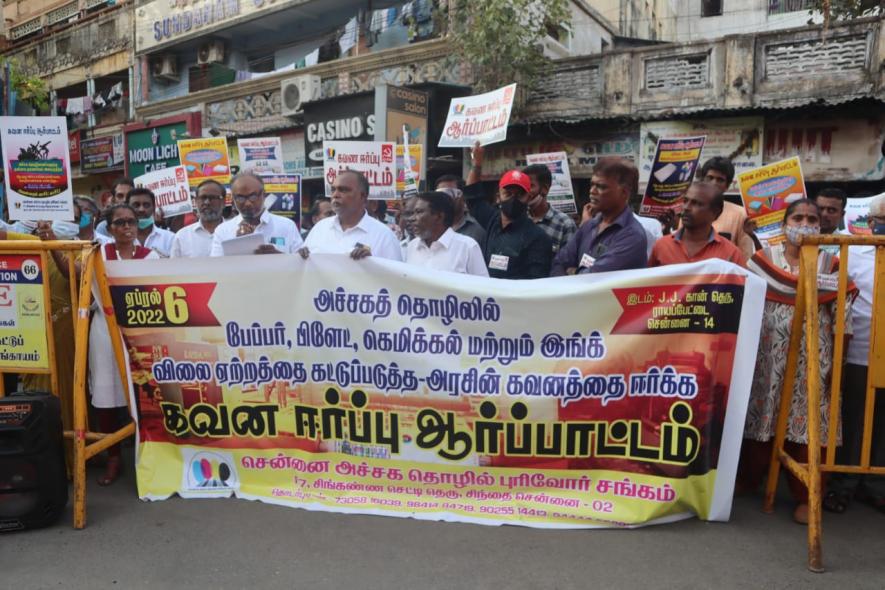TN: Frequent Price Hikes Hit Printing Press Industry, Job Loss Feared

Thousands of small and medium printers across Tamil Nadu face the threat of shutting down due to an increase in prices of the basic commodities required for the operations. The ink, plates, and papers prices have increased manifold in just four months, affecting the industry badly. The prices have been increasing steadily after the lockdown imposed during the COVID-19 pandemic.
The owners and workers of the printing press held a protest in Chennai on April 7 against the failure of the governments to control the prices, while a total strike was observed in the Coimbatore and Tirupur districts.
The Chennai Printers and Workers Union office bearers also accused the dealers of further burdening the end-users by increasing their commission at every instance of price rise.
The industry awaits a regulatory body to control the prices of essentials of the printing industry and supply of products manufactured by government organisations to be sold through cooperative societies so that the small and medium printers can afford them.
The technical advancements in the sector, though welcome, are also posing a threat to the survival of the traditional printers, already stuck by the price hike.
PRICES HIKED TWICE IN FOUR MONTHS
The prices of basic products required for the printing industry are ink, plates and paper. The industry has a very strong presence across the state though it has a high concentration in Chennai, Sivakasi, Coimbatore and Tirupur regions. An estimated 75,000 presses operate across the state, employing around 2 lakh people directly and indirectly.
"The price of all the essentials increased by 20% in January 2022 and another 40% from April 2022. This continuous hike has affected the industry badly," said T Jai Shankar, an office-bearer of the Centre of Indian Trade Union (CITU), to which the Chennai Printers and Workers Union is affiliated.
The companies have cited the increase in fuel prices and other raw materials as the reason for the hike.
Jai Shankar disagreed with this justification of the manufacturers and accused them of amassing profit at the expense of the printing press owners.
"Though there is an increase in costs of several goods as claimed by the companies, the hiked prices are not in proportion with their claims. A hike in 60% is too much to handle for most of the owners in the industry," he said.
IMPACT OF UNREGULATED PRICE FIXATION
The unregulated nature of the prices is only helping the manufacturers and the agents. The cost of all the materials has increased by Rs 500 to Rs 700 within a short period, affecting the operations of the printing presses.
M Sasi Kumar, who manages a printing press, said, "The cost of papers increases almost every day. The paper we purchased for Rs 2000 a few months ago now costs between Rs 2,500 and Rs 2,700. The agencies cite lack of supply and increased demand."
The CITU has demanded a regulatory body to check the prices of the materials and a system to control the manufacturers' agents.
"Whenever the companies hike the prices of the materials, the agencies also increase a similar or even higher amount. The agencies have near-total control over such issues," Jai Shankar said.
The prices of the materials started to increase immediately after the COVID-19 induced lockdown in March 2020. R Usha, an employee in a small printing press in Kanyakumari, said, "We believed that the price would come down after the relaxation of the lockdown conditions. But it has increased drastically in recent months. Reducing the prices to the pre-pandemic level can save the industry and our jobs."
ENSURE SUPPLY THROUGH COOPERATIVES
The printers have mooted the idea of supplying essentials through the cooperative stores to enable the end-users to purchase at a lesser price.
The Tamil Nadu Newsprint and Papers Limited (TNPL) is a major supplier of papers in the state, which is run by the government of Tamil Nadu.
"The government can ensure supply of at least papers through the cooperative, which is being done in Kerala. This can help the printers since the agents amass a considerable commission. Other materials can also be included in this list if the government takes creative and meaningful steps," Jai Shankar said.
The union has also demanded the reduction of goods and services tax (GST) on printing press materials from 18% to a lower slab to help the industry.
The introduction of new technologically advanced machinery results in the closure of several hundred printers every year.
"One technically advanced machine can perform the work of 20 small and old machines. The small and medium owners cannot afford such machines due to their financial feasibility. Though technical advancements are welcome, the closure of several printers and the subsequent loss of jobs are not considered", Jai Shankar said.
Get the latest reports & analysis with people's perspective on Protests, movements & deep analytical videos, discussions of the current affairs in your Telegram app. Subscribe to NewsClick's Telegram channel & get Real-Time updates on stories, as they get published on our website.
























